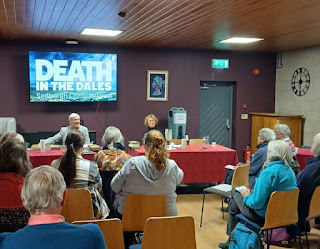Martin Edwards's Blog, page 18
November 6, 2024
Phil Rickman R.I.P.
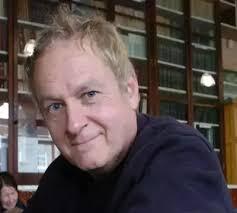
I was sorry to hear that Phil Rickman died on 29 October at the age of 74. He was a writer whose work straddled the mystery and supernatural genres. Although born in Lancashire, he lived in Wales for most of his life and he had a great affinity with the country. He wrote three books under the name Will Kingdom, and two as Thom Madley, but he is best-known for the novels he wrote under his own name which featured Merrily Watkins.
I didn't know Phil well, but on my few encounters with him I found him extremely pleasant. Our first connection came when he interviewed me a couple of times on Radio Wales about the Lake District Mysteries. Landscape interested him and he evoked it well in his own work. He was a good broadcaster and a very capable interviewer. We finally met in person fifteen years ago, when we both took part in an enjoyable event held in a terrific historic setting - Ludlow Castle.
On that occasion Phil revealed that he was in talks with regard to the televising of the Merrily books, although such is the nature of the TV world that six more years were to pass before Merrily finally reached the screen. A year or so later, he was involved with the CWA annual conference when it was held on his 'patch' in Abergavenny. A fun weekend, as I recall.
Merrily, a female priest who is an exorcist, was played on television by Anna Maxwell Martin in a three-parter called Midwinter of the Spirit. The cast also included David Threlfall and Siobhan Finneran. I enjoyed watching it, but for whatever reason, Merrily did not become a fixture on the screen. On Phil's website, there are some comments which give clues to his dissatisfaction - he regarded himself first and foremost as a crime writer rather than a horror writer and he saw the Merrily books as crime stories, albeit seen from the perspective of an exorcist. Perhaps unsurprisingly, he felt that the TV version wasn't fully in tune with the novel on which it was based. But as he said, he couldn't complain, and he continued to write quietly accomplished fiction that was both polished and very readable.
November 4, 2024
Trial of Christiana Edmunds by Kate Clarke
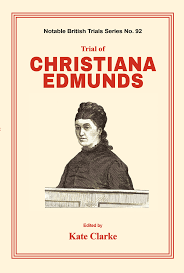
Kate Clarke is a doyenne of British women true crime writers. It's often forgotten how many women have been first-rate writers on the subject of true crime - Fryn Tennyson Jesse, for instance, was a leading light in the field for decades - and Kate has been writing high-calibre books for at least as long as her distinguished predecessor. With Bernard Taylor, she co-wrote Murder at the Priory, which was shortlisted for the CWA Gold Dagger for Non-Fiction.
Her latest publication is an entry in the happily revived series of Notable British Trials - it is number 92 in the series, and it's an account of the trial of Christiana Edmunds. This case is truly fascinating and among those crime novelists who have referenced it are Anthony Berkeley and John Dickson Carr. It is a murder mystery that involves poisoned chocolates - definitely one of my favourite detective fiction tropes!
Christiana Edmunds was a deeply disturbed woman who became obsessed with a doctor in Brighton called Charles Beard. She knew Dr Beard and his wife Mary socially, and it may be that Beard, deliberately or unwittingly, encouraged her friendship with him. If so, he paid a very heavy price, as her obsession took a very dark turn indeed, leading her to carry out a series of poisonings in the town from 1870 onwards.
Her first victim was Mary Beard, and although Mary survived, Christiana embarked on a campaign of lacing chocolate creams with strychnine. One child died as a result and others were made seriously ill. Eventually she was found guilty of murder, although her death sentence was commuted to life imprisonment, and she spent the rest of her life in Broadmoor, dying there in 1907. Beard was among her victims: his own mental health was destroyed by his involvement in the case.
Kate Clarke provides a crisply written and detailed introduction, and in addition to the fascinating trial transcript (I noted that Christiana's defence counsel referred to her 'idiotic vanity' among other things...) there are useful appendices and a good index. For anyone interested in this remarkable case, this book is required reading.
November 1, 2024
Forgotten Book - Better Dead

I've been meaning to take a look at the work of John and Emery Bonett (the writing name of a husband and wife team, John Coulson and Felicity Carter) for some time, but I've only just got around to their 1964 novel Better Dead. The story is set in the Costa Brava, an area the couple knew very well. My recent trip to Spain seemed like the right moment to give a try to this novel (known in the US as Better Off Dead). Overall, it's an odd one, a mixture of genuinely pleasing elements and deeply disappointing flaws.
Let's start with the positives. The fictional town of Rocadamor is nicely evoked (it's clear that the authors, who settled in Spain in later life, were disenchanted with life in England), the police detective - who is called Borges - is appealing, although off-stage for most of the novel, and the writing is agreeable, with prose a cut above the average. The way in which the story ends is also quite well done.
However, I had major reservations about the plot and structure, reservations closely connected with some aspects of the characterisation. The story begins with two Englishmen, a head teacher who is about to open a school for local children and the architect he has hired, discovering a body. The corpse belongs to a bar manager called Ferdy whom they both had reason to detest. I'm afraid that I found the way they reacted to this discovery to be utterly implausible.
We then have a very, very long flashback, in which we're introduced to a variety of local characters, mostly English, all of whom seem to have possible motives to kill Ferdy. They are an interesting bunch, but unfortunately, I found some of those motives unconvincing. In a way the trouble stems from the fact that the characters are quite well-drawn. But if one creates intelligent people who behave in a consistently stupid way, that behaviour needs to be convincing. Of course intelligent people behave foolishly very often in the real world, but in fiction there does need to be a degree of believability - and I felt the Bonetts failed to supply this. I couldn't really get my head around why the culprit behaved as they did. As a result, in my opinion the plot doesn't really work. A shame, because this is a book that I wanted to like more than I did. Frustrating.
October 30, 2024
Ludwig - BBC TV review
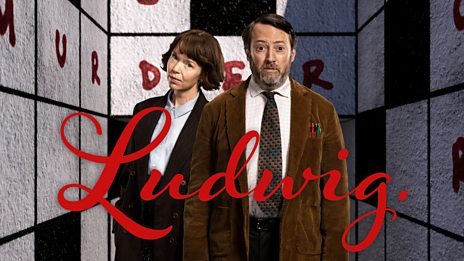
Puzzles are all the rage at present. It's a fashion, and like all fashions it will pass in due course, but as a lifelong puzzle fan, I'm delighted that they are having a moment. And it's a very big moment. I enjoyed meeting G.T. Karber, whose Murdle books have been such a big hit, at CrimeFest, and I've been interested to see the recent flood of murder mysteries with a puzzle element. Of course, like any other type of book (or any other artistic venture, come to that) they vary in quality, from the excellent to the banal. But the best ones are truly enjoyable and offer an opportunity for escapism at a time when escapism seems extremely appealing.
So I was interested to watch the new BBC TV series Ludwig. Some people have compared it to Jonathan Creek, but I think it's closer to Death in Paradise - no great surprise, since the creator and writer of Ludwig, Mark Brotherhood, has worked on the Robert Thorogood show. I don't know Mark Brotherhood personally, but I've read some of his interviews and I find his approach to his craft likeable and intelligent as well as highly professional.
The premise of Ludwig is unlikely in the extreme, and it requires two exceptionally appealing actors - David Mitchell (Ludwig, aka John Taylor) and Anna Maxwell Martin (Lucy, wife of John's twin brother, James) - at their best to persuade us to suspend our disbelief. In a nutshell, James is a policeman who has suddenly and mysteriously disappeared. Lucy persuades John to impersonate him in order to find out what has happened to him. And when John does this, not only does he get away with his imposture, he solves one baffling mystery after another in very quick succession.
If you can accept that - and after some initial reservations, I managed to do so - this is perfectly enjoyable light entertainment, with a variety of puzzles, including a locked room mystery to solve. The Cambridge setting makes an ideal backdrop, and having watched all six episodes, I'm pleased that another series is said to be highly likely.
October 28, 2024
Back from Bilbao



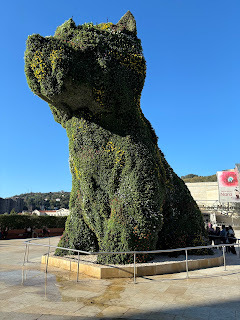
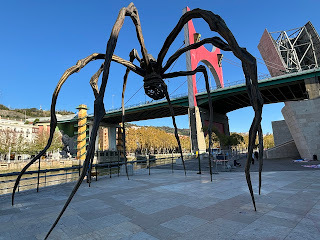
I've just returned home after a relaxing week-long cruise from Liverpool to northern Spain. It came at exactly the right time for me, as I've been battling with a tough deadline for ages and I finally managed to deliver just 24 hours before the sailaway. Phew! Cruising from Liverpool was a new experience for me, and a good one. I'd definitely like to do it again sometime.


Because I'd been hard at work for what seems like ages with various writing projects, my focus was on getting time to decompress and this worked well. Within an hour or so of getting on board, I'd spotted a copy of one of my novels in the ship's library, heard some great music and watched an exciting finale to a football match. A good start, and things carried on in that vein. I read five crime novels, all of which will feature as Forgotten Books on Fridays in the future. Suffice to say at this stage that they amounted to a mixed bag, but ideal light entertainment.

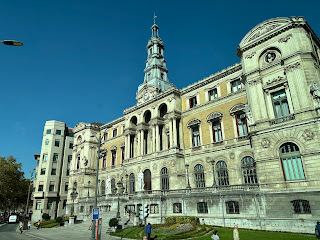

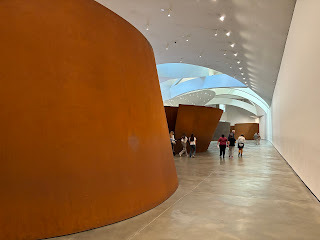

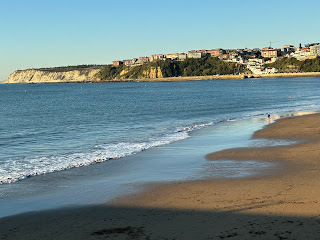
The highlight of the trip was a day in Bilbao and a visit to the Guggenheim Museum, which is architecturally stunning, both inside and out. Some of the works of art inside might be regarded as an acquired taste, but it was a fun visit. The local resort of Getxo (lowest photo above) was also worth a visit. Another good trip the following day was to Gijon, a coastal town I'd never even heard of before the trip, but which proved to be quite delightful and certainly photogenic. A hidden gem, I'd say.

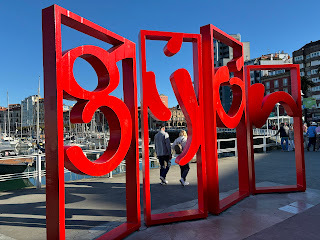
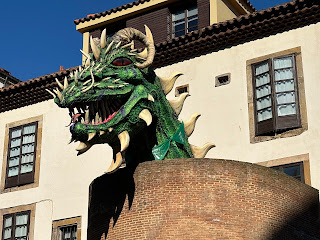

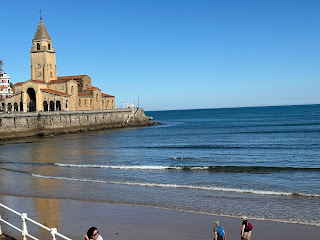
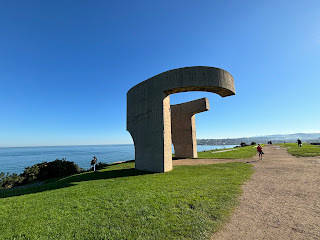
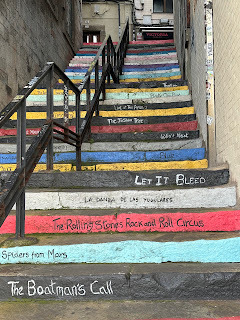
After several days of sunshine our luck ran out on Friday with torrential rain coinciding with a stop at La Coruna. So we had to content ourselves with wandering around the puddled streets and waterfront (see below) before retreating to the observatory lounge to view the Pillars of Hercules lighthouse from the dry. The sea was quite wild that day.
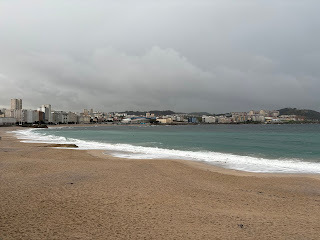
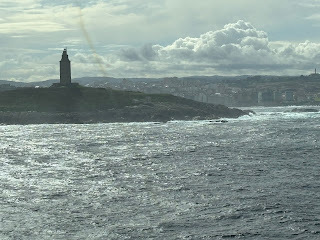
But considering the time of year, this was hardly surprising, and my overall feeling on returning home was that the trip had more than lived up to expectations. During the pandemic, there were moments when I wondered if I'd ever go on another cruise, but the industry seems to have proved more resilient than most people expected and there were plenty of first time passengers. A great week.

October 25, 2024
Forgotten Book - Death in Shallow Water
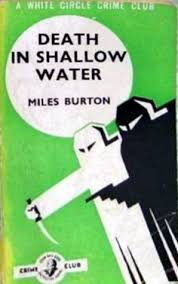
Miles Burton's Death in Shallow Water (1948), another Desmond Merrion mystery, contains a number of enjoyable ingredients, even if Merrion only plays a significant part in the closing pages (when he wraps up the case in a trice, naturally). Like many of the books written by John Rhode under that name or as Burton, the murderer's m.o. is cunningly conceived. In this case, no fewer than four people are murdered in shallow water, so the story more than lives up to the promise of its title. One wonders, though, why such a clever villain failed to think up different ways of killing people so as to divert suspicion.
In the first chapter, a rather mysterious chap who introduces himself as John Morston visits Winderport and makes enquires about the former boat business owner Sir William Watkyn and his former colleague Captain Barnham,. Morston evidently knew them years ago. He is an affable chap, but we have the feeling that his enquiries disguise a hidden agenda. He is directed to the lonely village of Windersham, where he is thinking of renting a cottage.
The scene then shifts to the Watkyn household, a week later. Sir William is rich and elderly and Lady Watkyn is younger and rather unpleasant; she treats her niece Hester like a servant. Barnham and his two adult children live nearby, but Barnham is not on the best terms with Sir William. The other major characters are a local vet called O'Brien and an elderly former seaman called Soames.
The small community is rocked by a series of deaths by drowning, so many that Inspector Arnold of Scotland Yard is called in. But he can't find any evidence of murder, even though it seems clear that money is a potential motive for some or all of the people connected with the victims. There is plenty to enjoy in this mystery, but its weakness is that Burton/Rhode, as so often, prized ingenuity of murder method over ingenuity of storytelling. So the identity of the culprit is screamingly obvious. Despite that, however, I enjoyed reading the story.
October 23, 2024
The Lady in the Lake by Jeremy Craddock
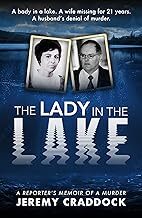
Jeremy Craddock is a lecturer and former journalist with a genuine talent for narrative. I've known him for a number of years and I was extremely pleased by the success of his first true crime book, The Jigsaw Murders, a readable and long-overdue account of the Buck Ruxton case, which has fascinated me for years - so much so that, at one time, I toyed with the idea of writing it up myself.
Now he's turned his attention to a more recent mystery. Again it's one in which I've long been very interested, not least because it's a Cumbrian case - and in fact it was a real life cold case, though rather different from those with which Hannah Scarlett has to deal in my novels. Not only is it one of the most extraordinary British murder cases of the past fifty years, it's one with which Jeremy has some personal connections, arising from his time as a reporter working in the Lake District.
The Lady in the Lake is the story of the case of Carol Park, the teacher whose body was found in Coniston in 1997, long after she disappeared back in 1976. One of the truly shocking and hard-to-believe human details in the story is that, in a completely unrelated scenario, Carol's sister had also been murdered. The agonies her family must have gone through are unimaginable.
Jeremy gives the narrative a personal flavour, and this works well. His incidental observations on the changing nature of journalism are of real interest. He explains that the obvious suspect in the case was Gordon Park. At the time Carol's body was discovered, Park was a retired teacher who had married for the third time. It should also be mentioned that various members of his family believe to this day that he was an innocent man. The police struggled to find compelling evidence of his guilt, even though there were various highly suspicious circumstances. However, seven years after the body was discovered, he was found guilty of Carol's murder, and in 2010 he committed suicide in prison. A recent campaign to secure a posthumous pardon has failed.
The Lady in the Lake tells a gripping story and tells it well. The Jigsaw Murders was nominated for the CWA Gold Dagger for Non-Fiction and I expect this book to do at least as well. One minor quibble is the absence of an index. The publishers should not, I think, have skimped on this. There aren't many non-fiction books that don't benefit from an index. Overall, though, this doesn't matter much. The Lady in the Lake is a successful and consistently interesting study of an extraordinary murder case.
October 18, 2024
Forgotten Book - The Players and the Game

It is thirty years since the death of Julian Symons, a writer whose fiction and non-fiction had a considerable influence on me, and I've enjoyed going back to several of his novels lately. Today I'd like to talk about The Players and the Game (1972) - I have a vivid memory of reading this when I was supposed to be revising for my A-Levels. But maybe, despite the sometimes shocking story material, it was a good way to have a complete break! I've but after a gap of thirteen years, I've read it yet again, so it's time to revisit my feelings about the story.
There really is a lot going on in this book. First and foremost, it's a whodunit, and a clever one. Second, the crimes are to some extent based, as Symons acknowledges, on the Moors Murders and the Lonelyheart Killers case. Third, there's an exploration of the philosophising of Nietzsche (not someone to get too keen on, remembering how his own mind disintegrated). Fourth, there are two case studies of mental breakdown experienced by key characters. Fifth, there's an examination of bourgeois English society of the early 70s. Sixth, there's a police investigation, with a range of detectives looking into a case of disappearing women which morphs into a hunt for a serial killer' mistakes are made which have disastrous results. And finally, there's a look at business life, something that Symons touched on several times in his work.
That's a huge amount of ground to cover in a novel that isn't especially lengthy. Fortunately, Symons writes with such economy that the story doesn't feel cluttered, even though there are a great many characters, some of them only lightly sketched. A while ago I discovered that Symons consulted his friend Alan Eden-Green for details about the world of personnel, and inscribed a copy of the book to Alan and his wife thanking him for 'his help with job enrichment, lavatories and the Jay Burns Lawrence course', all of which play a part in the story.
There's another feature of this book worth noting. Today, fifty-two years after its first appearance, an attempt at a cutting-edge presentation of contemporary mores is actually a document of social history. And in some ways the most shocking aspect to modern readers may be the way that an older man's mistreatment of under-age girls is handled; it certainly isn't glossed over, but nor is it treated in the way it would be today. So many of the attitudes portrayed - often, but by no means always, with a satiric touch - in the story now seem very dated. The Seventies were definitely another country.
October 16, 2024
The Dedicatees of Hemlock Bay
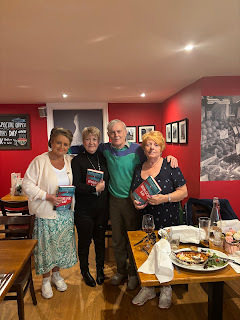
Monday was a special day for me. This was because I got to have lunch with three wonderful people who have meant a good deal to me over the years. Their names are Ann Geraghty, Lea Doran, and Jo Wright, and between them they have worked, in succession, as my secretary/PA ever since 1990 (the year before my first novel was published). Without their support in the office, I would have found it difficult to combine twin careers as solicitor and author in the way that I have done for so long.
It's very important - essential, really - to get on well with people you work closely with on a day to day basis. I've been lucky to have three people of the personal and professional calibre of Ann, Lea, and Jo helping me for such a long time. Quite apart from their daily support in the office, they have also not only been very tolerant about my obsession with writing - even though it's quite a strange thing to combine with being a full-time lawyer - but have gone out of their way to make it easier for me to lead this unorthodox double life.
Hemlock Bay is, I feel, one of my strongest novels, perhaps even the best so far - but of course, it's not easy for authors to judge their own work. When the time came for me to decide to whom I should dedicate it, the idea of a joint dedication to Ann, Lea, and Jo seemed very appealing. And on Monday we finally had the chance to get together, at a restaurant in central Liverpool, to celebrate.
The lunch was a lot of fun and there were many reminiscences - especially since I'd not seen either Ann or Lea for quite some time. The time flew by. The only question now is: what will they make of the book?
October 14, 2024
Death in the Dales
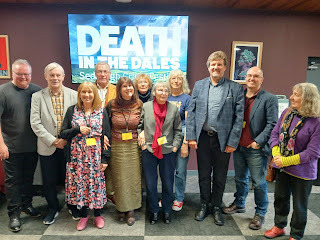
Sedbergh is England's Book Town - not as well-known, perhaps, as Hay-on-Way (Wales's Book Town) but a lovely place and I've just returned from a delightful weekend there, taking part in the town's first crime fiction festival, Death in the Dales, organised by the trustees (including my good friend Jean Briggs, former Vice Chair of the CWA) and supported by a hard-working group of volunteers and Westwood Books, an excellent bookshop in the town, which I always enjoy visiting: they have a large and varied stock and plenty of interesting rarities.
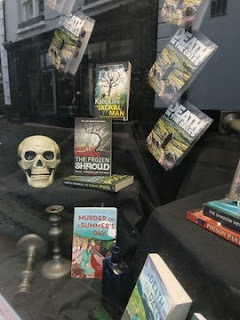
We arrived on Friday afternoon and the opening event was a film show, hosted by Matthew Booth, featuring the classic film noir The Big Heat. On Saturday morning, Kate Ellis and I kicked off the day with a conversation about crime fiction and I was also involved in the afternoon, talking to Jean about collecting crime fiction, a subject which I hope was very suitable for a book town. I brought along various items that I've picked up over the years and also discussed the connections between my research into the genre and collecting.
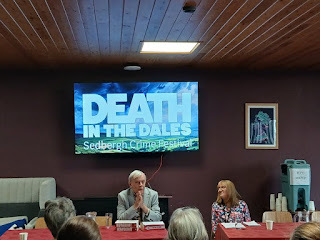
Matthew concluded the day's events with a one-man show about Sherlock Holmes and then a group of us went off to a delightful dinner to celebrate the birthday of another good friend, Dea Parkin. Among the writers present were Antony Johnston, Fiona Veitch Smith, Marsali Taylor, David Beckler, Harry Navinski, Frances Brody, and Jason Monaghan. A lovely evening.
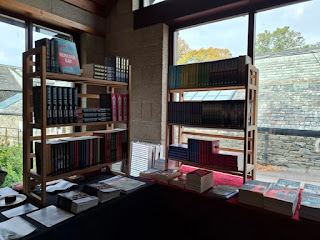
On Sunday, I took part in the concluding event, moderated by Marsali, a discussion about setting with Frances and Malcolm Hollingdrake. I'm very glad that the hard-working team who put on the festival were rewarded with good audiences who showed a great deal of enthusiasm for all the sessions. It was an absolute pleasure to be part of it.
